Again war, again suffering, necessary to nobody, utterly uncalled for : again fraud, again the stupefaction and brutalization of man.
Lev Tolstoy, 1904
This quotation from Tolstoy is displayed at the very beginning, in the dark, when the curtain opens on a set that we can guess in the darkness. It is from this essential quote that the whole show must be read.
We must also consider another question, linked to the immediate topicality that is in the minds of all spectators : do the events of history shed explain our present ?
Finally, it is in itself an important event that an opera work becomes in some way a political object of today, which makes opera, an art that is said to be outdated, in its death throes, directly relevant to the life of the city. And the Bayerische Staatsoper (Bavarian State Opera), on 5 March, placed opera at the heart of the city, in direct contact with our anxieties, our emotions and our daily lives. Regardless of the outcome of the performance, these are important facts that few theatres can boast of.
Dmitry Tcherniakov is Russian, lives in Berlin, and recently (2019–2020) worked at the Bolshoi on a memorable production of Rimsky-Korsakov's Sadko that revisited Russian mythology, just as he recently revisited in Berlin the Wagnerian mythology of the Ring, and earlier that of Parsifal or Tristan und Isolde.Vladimir Jurowski, on the other hand, is Russian too, but has lived in Germany since he was a young man. One has to imagine the tug-of-war of each of them in front of the work, its ambiguities, and in front of the events that have tainted the world since 24 February 2022.
One must also consider both the distance necessary to carry out such a project, and the inevitable tearing apart of the work, which mixes the context of creation and the so-called eternal history of Russia, adding our own immediate history.
This is why, in a world where those who preach are more numerous than those who carry humanity and tolerance, we must refuse to judge the appropriateness or otherwise of presenting this work, because that is simply not the issue.
A work is given to us and we do what we want with it : we accuse directors enough of not respecting "the author's thoughts" and of doing what they want, not to salute, for once, the de-Stalinisation enterprise at work here : it was really the right moment to let the director "betray the work", if the work was what we say it is.
When one considers Tcherniakov's work, one reads first of all an effort to transcend the subject, while taking as a basis tangible realities, but not reducible to a single situation and a single country. Of course it is Russia, and it is an adaptation of Tolstoy, but Tolstoy's novel is a world novel, a global novel, which belongs by its power to the whole of humanity before belonging to an identity. Like Shakespeare, Aeschylus, Dante, Cervantes, Hugo, Joyce, Kawabata, Goethe, Kafka and others. To reduce the giants of literature to their ordinary and national identity is to abjure that which makes art and which transcends all kinds of borders.
Tolstoy's novel, as incredible rich work, shows a light aristocratic society for whom the war is always far away, which speaks French rather than Russian, and which finds itself in the second part of the novel at the heart of a war where the invader is the Frenchman whom we admired and wanted to resemble a few years before. Tolstoy's work is not kind to this society, even in its most idealistic characters such as Pierre Bezoukhov, and it shows the war in horrible bits, in a sort of black reverse side of a light, even indifferent front side.
Prokofiev, on the other hand, never stopped revising his work, to the point that it is difficult to conceive of a definitive version (there are four versions and the last one was probably not definitive), and on the other hand, he obviously added moments that glorify the unity of the Russian people against the invader, Napoleon in the work, Hitler in the context of its creation. And so the work is a weaving of sublime moments and big Stalinist machines designed to satisfy the “little father of the peoples”.
The work is thus a path strewn with pitfalls in itself, and the reader can refer to two productions that this site has (in French) reported on, that of Saint Petersburg by Andrei Konchalovsky, an "eternal Russia" version, and that of Calixto Bieito, in Geneva, a "deranged society" version. Here we have a third, scathing version, which aims to show the absurdity of all autocratic powers, and how the people pay for their folly.
Prokofiev's opera is structured in two distinct parts, first peace, then war, obviously parabolic. Peace is about love, courtly games, social conventions and the follies of youth. War is the daze and the desperate search for a remnant of humanity in the mass grave of bodies and souls.
From Tolstoy's novel, Prokofiev had to eliminate a lot to retain essentially only the final part and a few key elements, such as the couple Natasha Rostova/Andrei Bolkonski, a meeting that would almost begin as a Tchaikovsky-style romance and which is very quickly lost in contact with the court manoeuvres and family games of a mummified aristocracy : the whole of the first part shows this couple being made and destroyed more than destroyed, while around them waltz the puppets of good society.
The second part, the war, is more epic, presenting the parties involved, Napoleon and Kutuzov, the battles (Borodino), the famous burning of Moscow and Kutuzov's final triumph, against the backdrop of the dramatic Natasha/Andrei reunion, sanctioned by the latter's death.
This means spectacular scenes, a large chorus, a large crowd, and many roles (over 70). This is a challenge for any theatre.
The construction of the work is already an indication : the 'peace' part is a picture of the internal destruction of a society that lives on a slightly dirty cloud, and so the worm is in the fruit.
The "War" part is more heroic and leaves room for the armies and the "people", it is much more choral, less plot, more action.
Tcherniakov's stroke of genius is to erase this opposition, to show from the start the war worm devouring in bits, then in whole sections, the whole human fruit.
The general elements of the production
Unlike his Ring, whose setting is a world in itself, a sort of labyrinth through which the characters pass, Ycherniakov (who does not conceive of a production without conceiving the space himself) has concentrated this world-work in a single, highly referenced setting, far from a parabolic abstraction : that of the Column Hall of the Moscow House of Trade Unions.
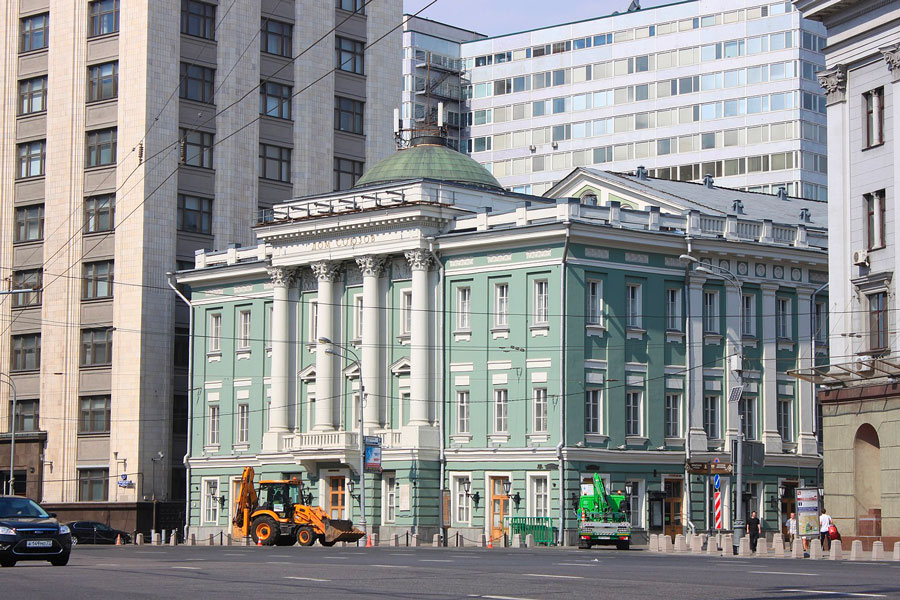
A place that is remembered mainly because the remains of Lenin, Stalin, and other Soviet hierarchs until Gorbachev recently were exhibited there, but which also hosted Communist Party congresses, balls, parties, shows and concerts, and which was also used as a Lazaretto during the First World War : everything was done in this hall. This polymorphous aspect makes it an ideal theatrical place, which speaks strongly to the imagination because it is a choral place. Tcherniakov is saying to us, in a way, "we have done everything in this room, let's also make theatre".
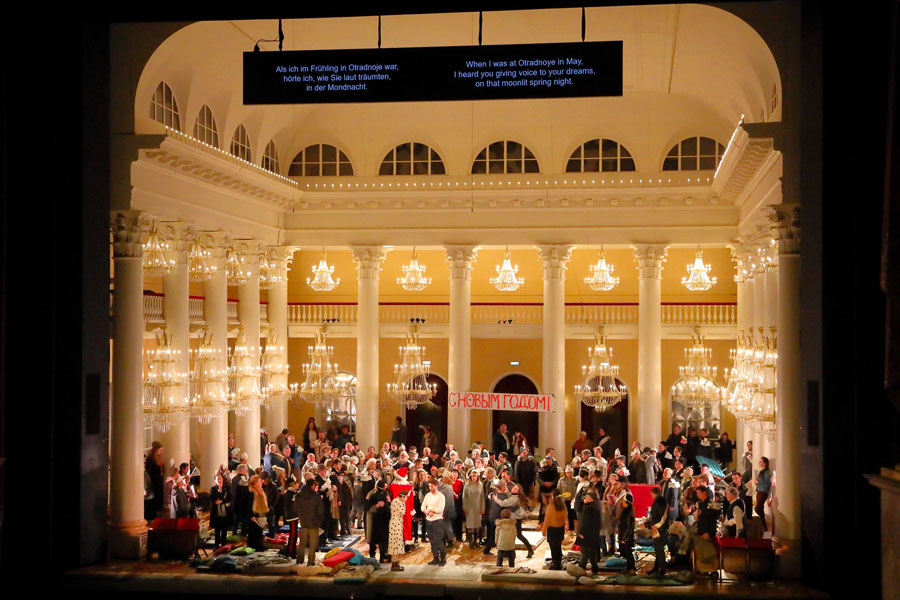
Inside this monumental space (the set is impressive and reproduces the smallest details of the original), Tcherniakov places a world of (war?) victims, with bundles and makeshift beds as if everything were already over, as if War and Peace were to be played out in “War and War”, and that peace was only a game within the war, a game of war in a way. In War and Peace, there is only war…
The second consequence of this "chorality" is that the whole show takes place in front of everyone's eyes, in the midst of people reading, sleeping, eating (everyone has his or her function in this prodigious kaleidoscope, the work on each individual is impressive, incredible even) and consequently there is no room for the intimacy of an individual adventure, except when everyone is asleep, but there is also little room for precise identities : everyone emerges at some point from the crowd to play one scene or another, without knowing who is who being of any real importance, even if the main characters are introduced from the second scene (the ball).
All these lives, between reality and projection, are in fact lives ruined from the start.
And Tcherniakov underlines this even before the music begins, when Andrei (a shattering Andrei Zhilikhovsky) stands up, takes off his parka, his scarf, to appear in a sweet-shirt, which will be his signature suit, with a little Wozzeck look, and lets out a howl of pain, just before the music begins, and he points his gun at his heart.
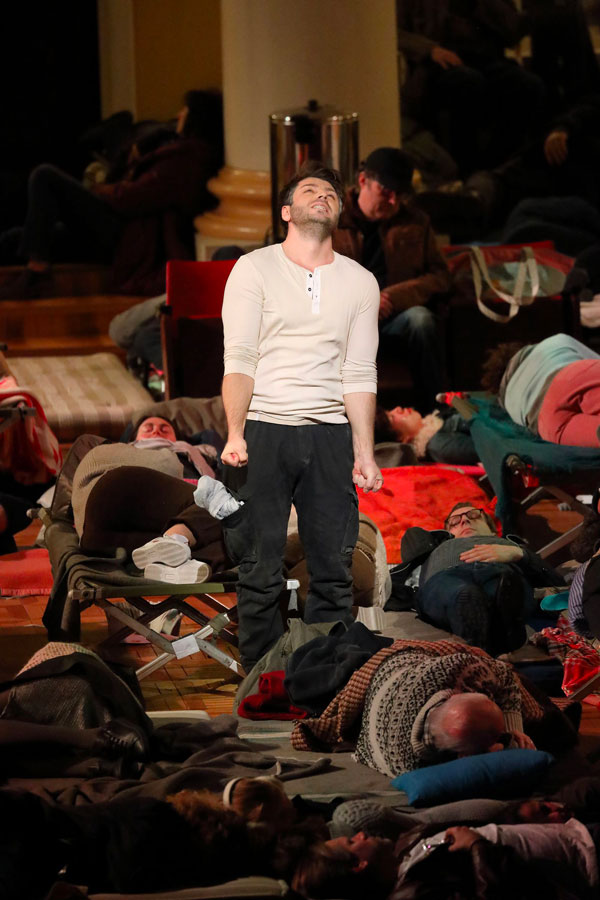
In fact, Andrei is naked, of that nakedness that makes him defenceless, of that almost asocial nakedness that will be his fate, of that nakedness of heart that we identify in the first image, when he appears standing in that sad sweet-shirt. First visible image, a being who seems defenceless, and who desires death in the middle of a precarious population, something almost normal, almost admissible, one would say almost ordinary. It all starts with an almost ordinary suicide attempt.
Andrei only comes back to life when he hears Natascha singing with Sonja, which will give rise to a love story. In Konchalovsky's St. Petersburg it was almost a Tchaikovskian genre scene, with Andrei hidden away while Natascha sang in the balcony, and in Bieito's Geneva it was like a birth scene.
In Tcherniakov's world, everything is already over, all life is as if on hold, and in this society on hold, we will simply mime life, social relations, loves and betrayals. For every society, in order to survive, needs its illusions.
The message is one of sadness and darkness that embraces. From the moment the curtain rises, we are in a game of massacre.
Finally, theatrically, we find ourselves in a unique space, with an ever-present chorus and in the midst of games that mime life, as if with masks : we are on the threshold of Greek tragedy.
What Tcherniakov shows us is the tragedy of war, with Tolstoy in the spotlight, which takes as its main character neither Andrei nor Natascha nor Pierre, but the group, the chorus, the "people", the ones who in all these affairs are the front-line victims.
In this world where everything is already lost, the pantomime of life is played out and everything becomes terribly grating, before becoming terrible and then unbearable.
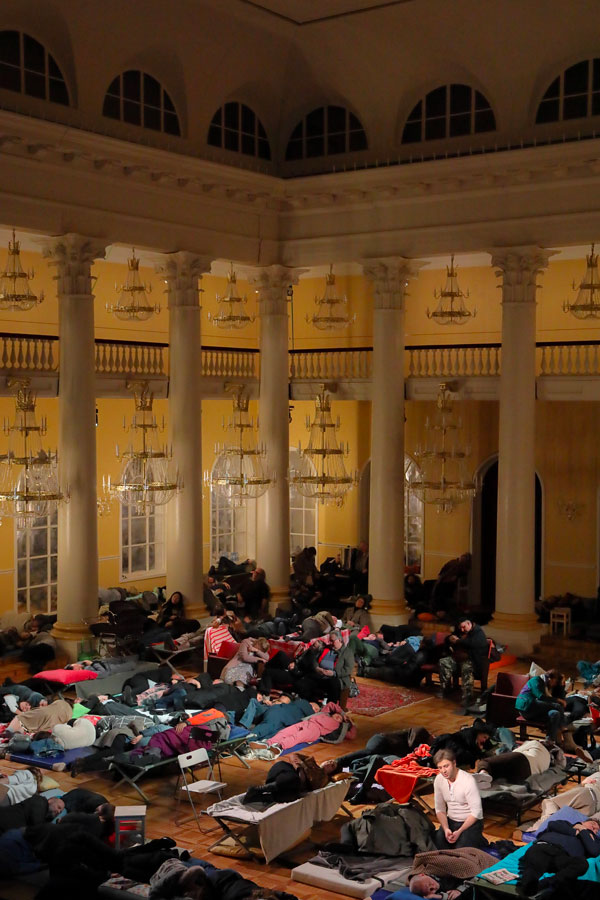
Part 1 : "Peace".
The first scene (after Andrei's failed suicide and his scream of pain…) leaves a hope of an opening, with Andrei in the foreground sitting on old theatre seats (left over from demonstrations in the House of Trade Unions ? or theatre seats because we play at the theatre of life when real life has fled) and behind him stand, unable to sleep Natascha and Sonja. Their eyes do not meet and Andrei is almost dreaming of this young girl. It's an incredibly fresh moment (the music is admittedly lyrical) and very poetic. Thanks to an incredibly precise direction of the actors, the singers touch us with their gestures, their inflections, their slightest movement :
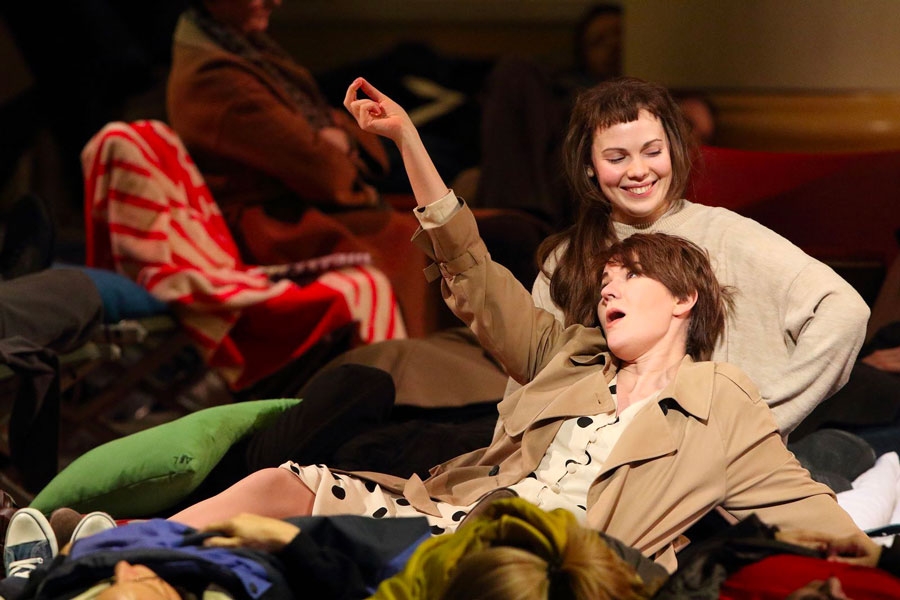
On the one hand, the two young women who remain awake in this room where everyone is asleep, with their efforts to go back to bed without succeeding in getting back to sleep, and on the other, this Andrei with his timid and awkward gestures, with his tender and almost victimised looks, all restraint, dreamy… This game already tells us something of what will happen next, of Andrei's reserve and Natascha's naive youth, in an initial non-dialogue that is already premonitory.
The structure of the work is made up of juxtaposed moments, like small episodes that mark a path or the path of destinies.
This first night scene was an initial meeting/non-meeting of the couple, the second scene a few months later is the actual meeting, in a court ball which is also Natascha's presentation to good society.
In Tcherniakov's work, it is the New Year's Eve party, the refugees/victims dress up, and have fun playing the party.
The stroke of genius is to turn a court ball into a children's party, with origami tiaras, paper fans, fake jewels, childish disguises that allow for everything, like children (whom we will see again in a much more sinister way later) who know nothing of the laws and social games, and who will mime it as they imagine it, so there will be a lot of dancing or sketching of dance steps, noisy laughter, and the game of a good society that no longer exists will be lived out. We will "play".
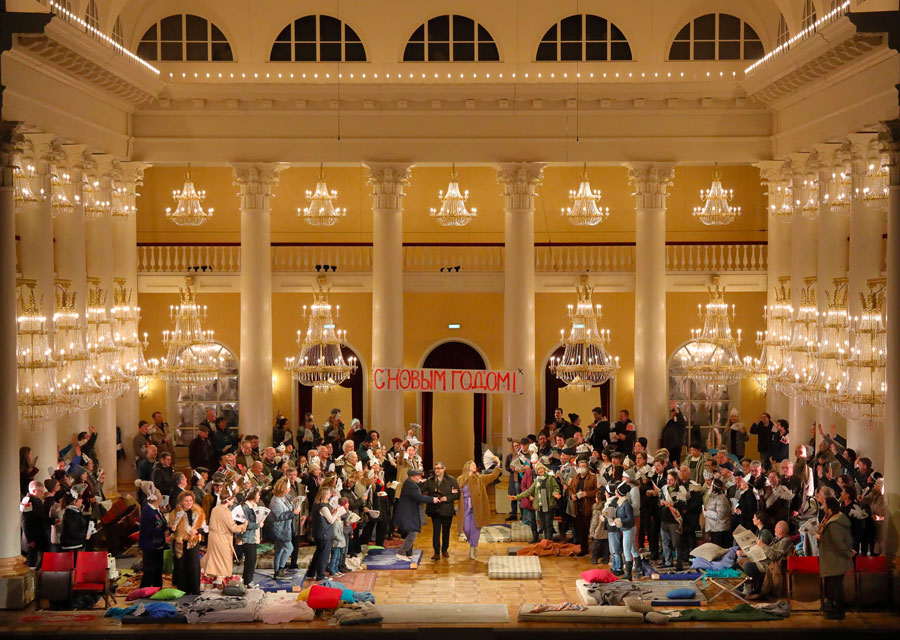
All the main characters of the drama are introduced, in a kind of social farandole where the columns and chandeliers look like a "palace", and where we should see a scene out of King Vidor's film or better, Serge Bondartchouk's one, while we see a ball of refugees or disaster victims who find the occasion (the New Year) to have fun.

In this landscape, the Czar, who is a silent role in the work, appears in a Boris Godunov costume with a Santa Claus touch.
This is the first image of power that will appear here, a Santa Claus Czar, like a sympathetic piece of furniture at a ball where we will play at being someone without ever really being someone, we discover Pierre, Hélène, Kuragin, Natascha and Tcherniakov reserve one of his most beautiful and moving moments in the efforts of the Natascha/Andrei couple to dance, to sketch out a waltz step, where Andrei is awkward and clumsy, shy and reserved, and where Natascha tries to lead him.
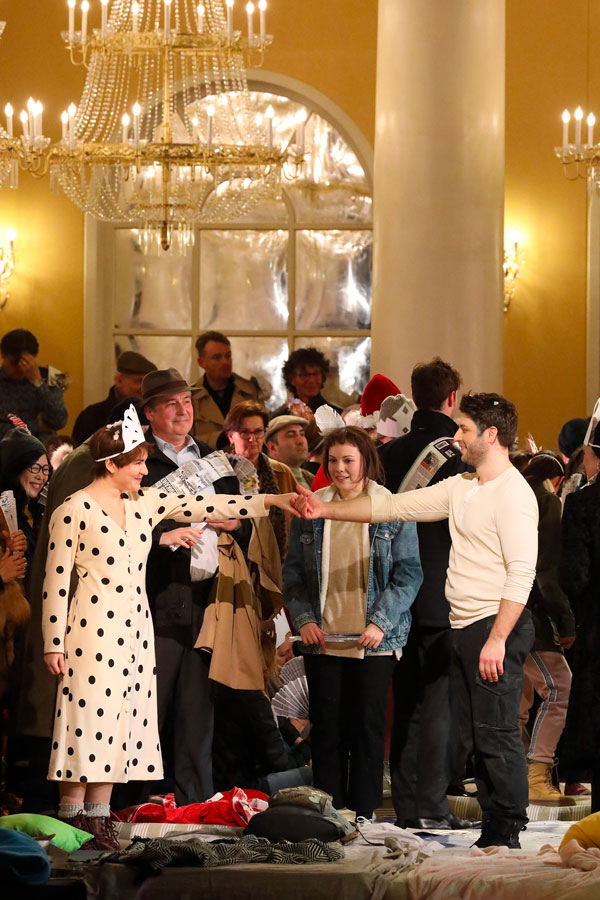
A scene that is neither derisory nor ironic, but which expresses the truth of this couple who have not been able to find each other, and a scene that will be found in a heart-rending version at the end of the second part.
In fact, Tcherniakov makes a date, as much for this couple as for the other characters, the light and worldly Helen, her husband Pierre, in the background, serious, reserved, and then the more accessory figures in the work, but essential as profiles, such as Maria Dimitrievna Akrossimova, Violeta Urmana, who plays an extraordinary character of a dignified old lady in a costume ideally found by Elena Zaytseva (woolen cardigan with large flowers, a discreet reminder of Russian shawl patterns).

The staging emphasises the characters “within the characters”, i.e. the simulated games of social codes, but does not necessarily emphasise the derisory, as in other works by Tcherniakov, on the contrary. There is a kind of game of despair in which everyone is looking for a possible happiness, trying to reconstruct a possible, where individuals are micro-worlds in the big world, under the gaze of the big world and therefore of all the others.
As has been pointed out, the whole of this first part ("Peace") is constructed by scenes which are slices of life separated by weeks or months, and which in this strange place, this non-place where everything is possible from a New Year's ball to a communist congress, appear as micro-episodes, details in the middle of the reality which is the camp of these victims of a war (or of a catastrophe) which is assumed to be far away. Small stories that are the stories of individuals, our stories, our tears and our disappointments. Tcherniakov manages to show a social globality and individualities and to play with this split : misfortune has struck, and yet one must try to live..
And life, the little life, is also made up of its little cruelties.
After the scene of the ball and the meeting of Andrei/Natascha, there is the scene of the Rostovs' visit to old Prince Bolkonsky, for whom this union is a misalliance.
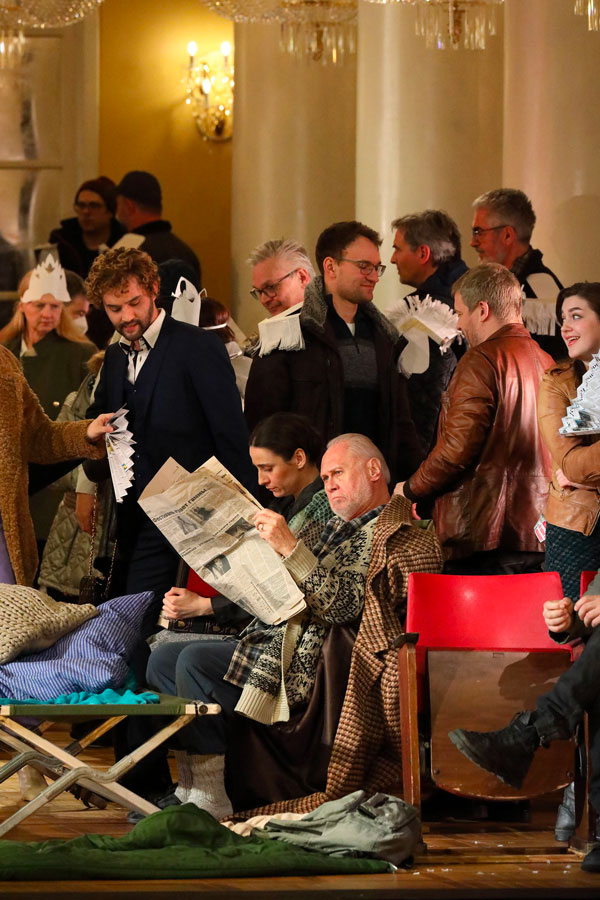
Once again, few gestures are needed to build the situation, and Tcherniakov manages to make this visit plausible amidst the folding beds and mattresses spread out and the waiting crowd. Natascha arrives full of hope with her father, and the old Prince (Sergei Leiferkus, a singing legend) refuses to receive them, and they are confronted by Princess Maria, Andrei's sister, who does not know what to say. Old Bolkonski will rise from a folding bed to humiliate the young girl.
After the ball scene, the scene of disillusionment, Prokofiev in the construction of the work plays with ellipses, and makes the moments collide. The third scene is the one in which Natascha is seduced by Kuragin, the womanising dandy.
In fact, Tcherniakov accompanies these moments by turning them into scenes of the ordinary life of a human comedy that masks the fundamental tragedy : he does not describe a society in decay, he describes the fissures, the progressive cracks, and then the collapses of a society already ploughed by misfortune, already struck, and because struck, condemned, where the purest and freshest feeling is laminated by the situation, where everything is exacerbated in the cruel game of relationships and positions.
Andrei, sent away by his father to avoid meeting Natascha, is already ready for war. Prokofiev, more than Tolstoy, makes the Natasha/Andrei couple an emblem, and Tcherniakov makes them his two expiatory victims. Andrei disappears from the scene, but he is obviously present, and Natasha is lost without distinguishing good from evil, without discerning anything, which is also another possible effect of the war.
The work also plays with the elasticity of time, in an almost cinematographic way, the first scenes are spaced out by a few months, then by a few weeks, the last ones are spaced out by a few days, a few hours, a night, as if time was folding instead of distending, as if it was becoming a crisis, with superimpositions that announce what is to come.
The Hélène/Kuragin group and their ilk is a milieu considered to be deleterious, amoral and scandalous.
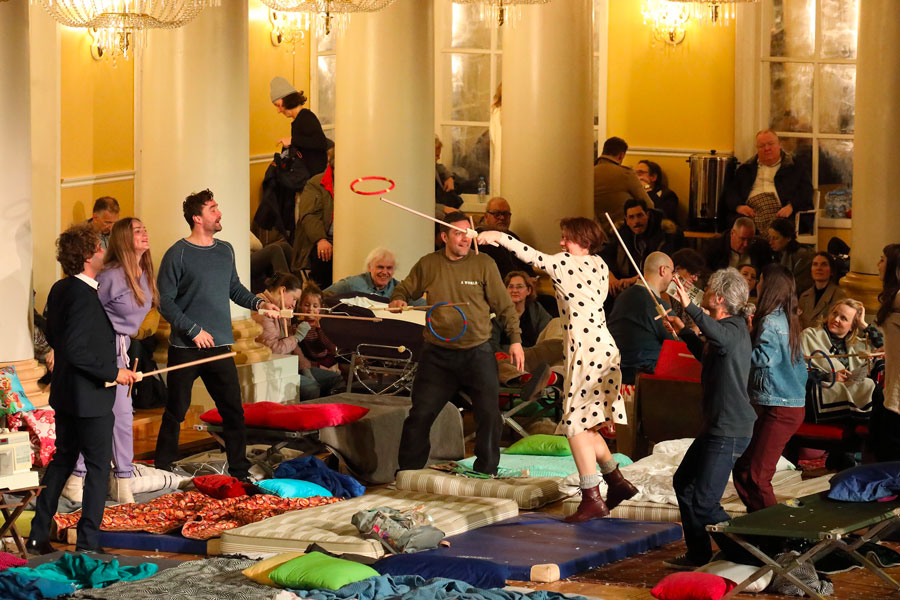
A group where everything is played with : we see them practising catching rings with wooden swords, a little game that is not so innocent (we play with wooden swords… war, always in the background) and it is a dangerously 'French' group, with an abbot and a French doctor, Métivier, who will quickly become figures of treason, at a time when Napoleon's troops are amassing at the borders.
Time is getting tighter as the war approaches ; the crisis is taking shape.
Thus, in parallel with Napoleon's still distant preparations, the worm rots in society and eats from within : Natascha becomes a kind of victim unknowingly contaminated by this evil.
The instrument ? Anatoly Kuragin (played magnificently here by Bekhzod Davronov). This society of victims locked up in this vast and closed place produces its own viruses and Kuragin is one of its emblems.
In the group led by his sister Hélène (who always shows up dancing) he is without faith, without morals, guided by immediate pleasure : everyone saves himself as he can. His favourite gesture ? He often does a dance jump on his way out, a sign of satisfaction and insouciance in this unfortunate environment. Precariousness of situation, opportunism, irrepressible desire to seduce guide him towards Natascha Rostova, naive, eager for life, terribly affected by the refusal of the old Prince Bolkonski, incapable of understanding social games, and therefore of distinguishing truth from falsehood and good from evil, who only desires one thing, to get out of this whirlpool.
The fruit is ripe.
Kuragin is drawn as the opposite of Andrei, where Andrei is reserved, the other spreads out, vulgar, between his friend Dolochov and Matryosha, the gypsy with the appearance of a prostitute, dressed in a superb fur coat which will be used by Kuragin to conceal Natascha during the kidnapping he is planning. The group quickly reads like small-time thugs, with the addition of Balaga, the henchman coachman who will lead the kidnapping.
On the other hand, Natascha prepares her meagre belongings to flee, as if Kuragin was giving her the opportunity to go outside, outside this space that has become suffocating, beyond promises, beyond renunciations and even betrayals. The social breach, in a closed universe, consists in escaping from it, in fleeing, always fleeing.
The failure of the girl's kidnapping (everyone quickly flees, leaving Natascha alone, with the fur that was supposed to hide her) provides the opportunity for two great scenes in the first part, on the one hand the one that puts Maria Dimitrievna (imperial Violeta Urmana), a sort of moral guarantor, face to face, who strongly but maternally nags Natascha, in the name of her promises, but also in the name of what she chooses without measuring it too much, amorality, ignorance, adventure, and in a way ruin. Through this choice also, the French influence, the increasingly pressing enemy. We wrote above that the worm is in the fruit, i.e. that moral ruin is rotting the social body from within and that it is attacking the most fragile. And this discussion between Natascha and Maria, which is very violent, attracts the attention of everyone around, who stand up and observe, as if it were simultaneously falling on the whole of society. The management of movements, expressions, the opposition between Maria Dimitrievna and Natascha, who also isolates herself from her cousin Sonja, who wraps herself in her fur, all that remains of the failure of the adventure, all of this is regulated with millimetre precision, which gives this moment an incredible force. The failure of the kidnapping and the flight of the "rascals" leave Natascha alone with her fur falling to the ground and prostrate in her makeshift bed, covered and maternally covered by a little wool that everyone tries to cover her with. And when Pierre swears to her that Kuragin is married, she strokes her fur one last time like the remnant of a faded dream.
The last scenes of the act feature Pierre Bezukhov as the protagonist, who leads the proceedings. Until now he has been a secondary character, like a benevolent shadow. Married (badly) to Helene and living more or less separately, he is as much the opposite of Helene as Andrei is of Kuragin. The character constructed by the director is that of a mature man, a sort of intellectual (thick glasses) who is a little unusual. He is a Freemason and tries in the novel to apply the precepts of the Enlightenment by freeing his serfs. Here he is a moral reference, as much as his wife is amoral. He talks to Natascha, who is buried under his blanket, in a particularly moving dialogue-monologue in which he confesses his hidden love. Natascha and Pierre will (in the novel) end their lives together. They are characters that life shapes, changes and turns upside down. In Prokofiev's work, Bezukhov is like a Deus ex-machina, who intervenes to save the savable, at least at this point in the story. He reveals to Natascha that Kuragin is married and therefore cannot marry her, but at the same time reveals to her that if he himself were 'free' and not married to Helene, he would marry her : a crossing of the fates. She then tries to commit suicide.
This is a turning point that reveals to the characters their truths and mistakes, that will make Natascha go from the carefree attitude of impossible dreams and wrong decisions (she secretly broke up with Andrei) to maturity.
For his part, in the next scene of prodigious tension, Pierre holds Kuragin.

The scene is again masterfully set, with the first part being a dance step by the little group around Hélène (the dance, as if on a volcano), a sort of derisory little ballet for four, where already the doctor Métivier alludes to the warlike tension with the French (he has been chased out of Prince Bolkonsky's house and called a spy). The second part is the interview between Kuragin and Pierre, with an unscrupulous Kuragin taunting Pierre, until the violent altercation (and again, all present stand and watch) where Kuragin, who is also a coward, takes fright. Pierre takes Natascha's letters back and offers Kuragin the money he needs to disappear, in a dialogue in which looks are avoided and Kuragin never ceases to show his weariness or indifference, so much so that, barely in possession of the bundle of notes, happy to get away with it, and provided with this viaticum, he leaves, not without having done his little dance jump, thus underlining the fact that he has obviously not changed.
Pierre remains alone in the middle, meditating on his life, on his mistakes, on a peace he cannot find, and on the sides the men and women return to their anonymity, while we can distinguish a child who stands out, as if his time had come, who first blows soap bubbles (like small light war-balls), an activity shared by some adults, then, at the moment when Bézoukhov is meditating on himself in a sort of bitter assessment of this first part, the child plays at war with a plastic weapon, mimicking the soldier on the lookout, then arrives in the foreground at the moment when Bézoukhov is told of the war (the real one), and "shoots" him with water, symbolically while the curtain falls. This is the way to announce the second part : the children's game that will become a blood game.
The games of society have ruined Natascha, Andrei, Pierre, they are the intersecting games of "suffering" and "deception" that Tolstoy spoke of in his opening quote and which are already the consequences of war
… And now the war is announced with the lightness of a child's game, in an image that is both poetic and terrible. It is the whole of the second part that will change in the same place, in another universe, more tense and cruel, the war of the puppets among themselves that a child announces with his toy.
What Dmitry Tcherniakov builds in his work is a theatre within a theatre. The chorus, always present, the people, always present, are spectators of a drama called War and Peace where everything is true and everything is mimed at the same time. The characters in the drama are like figures, emblems of what is being played out, in the second degree as it were. A drama within a drama, a kind of catharsis of war. Society is contemplated through the characters who evolve, hence the constant moments of 'spectacle', of little dances, hence the constant central space left for stage developments. Hence this final child in the Brechtian tradition, which points to the war ; purely didactic theatre, theatre of distance : we are close to Mahagonny.
Part 2 : “War”
The second part takes place in the same place with the same laws and some differences : the chandeliers in the main hall, which were bright when they were all lit (the very different and modulated lighting throughout Gleb Filtshinsky's performance should be emphasised), are all covered with black cloth, revealing a less harsh, more subdued light, a light that is hidden (wartime). This is the first visible sign of the changeover.
The second point is that the notion of a 'society' in waiting is erased in favour of that of individuals at war. Thus the central stage is occupied in turn by some of the protagonists, but above all by the chorus, which will offer the “spectacle” of the war that is being prepared and that will be suffered.
Thirdly, few characters survive from the first part, including Andrei, whom we meet again (he has long since chosen the army and the field, as we have said) and Pierre, who is still pursuing his fantasies and this time is seeking to assassinate Napoleon.
Among the female characters, Natascha is the only one who reappears in the penultimate scene, when Andrei dies.
In this second part, which is necessarily more epic (description of the war, with a look at the Russian armies, but also those of Napoleon), the aim is to reduce the original wider vision, to concentrate it in this room, the same one, and a little different, by showing the effects on the group and by displaying what I called above "the mass grave of souls". It is a question of confirming, of illustrating what Tolstoy says in the exergue of the show : "the stultification and brutalization of man."
It is pitch black in the auditorium, the silence is attentive and tense, and suddenly there is a choral explosion that has the effect of a kind of bomb, mimetic of war, coming from the silence and the darkness.
The whole group is facing the audience, occupying the central space which they had essentially occupied on the sides in the first part.
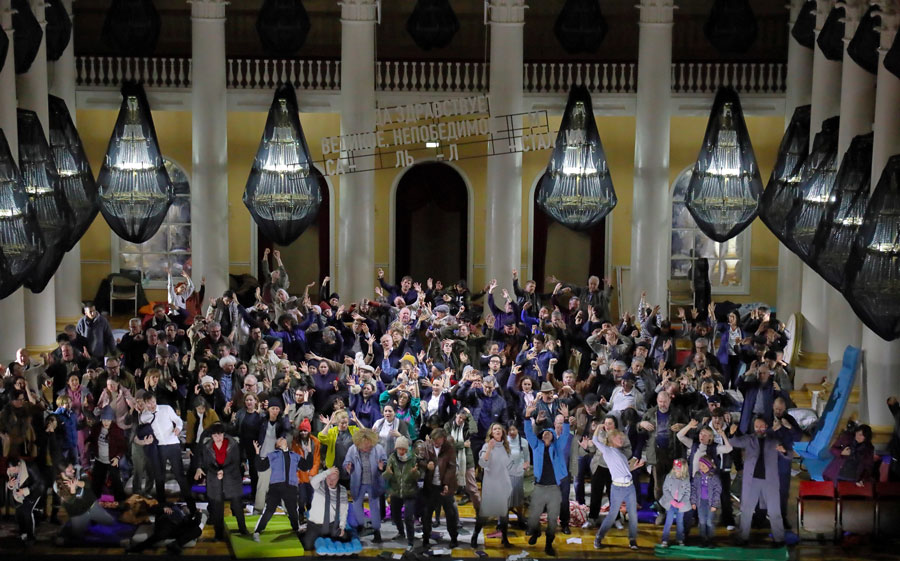
A group of individuals, men and women, screaming, miming fights, punching, hitting their chests, raising their arms, but with the strange impression that this machine, so powerful and so impressive, is running on empty, that the gestures are aimed at the wind, that once again we are watching ourselves do it and be at war, like this way of painting the Russian colours on the face (as we see on football matches), which is at the same time symbolic and derisory. But, at the end of this first picture, a scream (echoing Andrei's initial one) of a woman running out. Premonition. Return to the real.
Tcherniakov resolves the question of the epic passages of the second part by concentrating the action in the room again, this time showing not a society "in waiting", and a bit of a spectator through the adventures of the characters of the first part, relatively idle, between card games, origami and soap bubbles, but a society that goes to war and invades the stage to make a "war show".
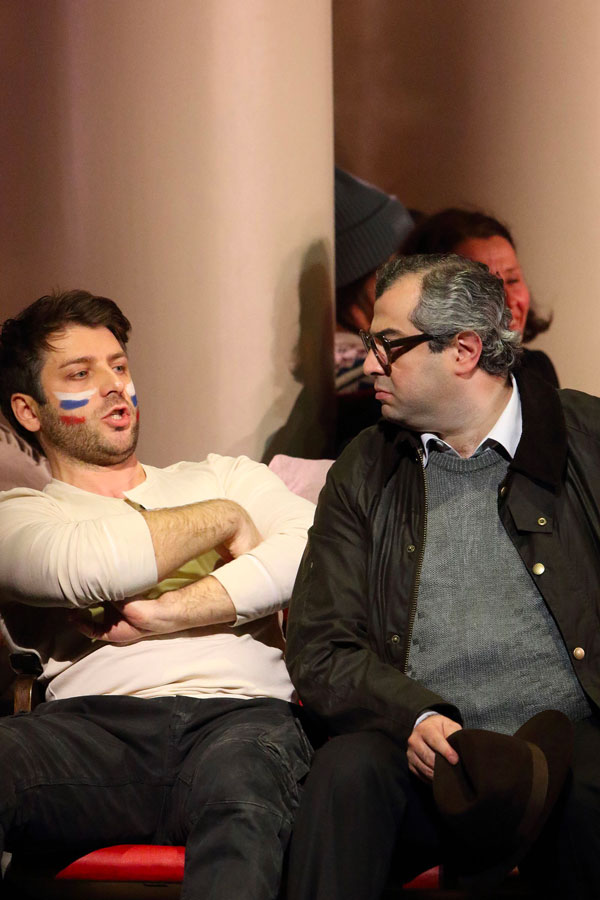
The second scene presents the battle of Borodino as a "war game", where we train a bit like in a gym, with mattresses set up as obstacles or serving as shelters, with false prisoners who make their entrance and are then tied up and machine-gunned. Then a "leader" waves a red flag and everyone gets up and frees themselves to practice treating the wounded, bandaging their legs and treating head wounds. We played the debutante ball in the first part, we play now war scenes, a bit like going to shoot propaganda films, to encourage the crowds. Moreover, the scenes concerned are illustrated by a title on a banner between two columns.
Tcherniakov succeeds in creating a real tension, in making this representation not a diversion but the expression of a truth. In the beginning of the second part, he never ceases to feed the idea that the real war is being played out, and little by little the whole of the second part will show a slow decay that will end up (almost) as a funeral operetta.
For the spectator in the theatre, the text says things that echo today's situations, the invader at the borders, the nation that wakes up and withdraws into its values, but at the same time the spectacle offered by the war is a kind of backstage that is even more terrible, that crushes beings and souls that we believe in without believing. Thus the chorus, which, by calling on Holy Russia, mechanically signs itself as a Christian symbol of identity, but so quickly and so mechanically that all this is put at a distance.
In this context, we see Andrei again, who meets Denissov, Natascha's first lover, and then Pierre, in an encounter where dialogue has difficulty developing. Andrei is always identical to himself, poor romantic Wozzeck. Pierre, on the other hand, is still a wilful man who wants to kill Napoleon, but will fall pitifully into the hands of the French.
In the midst of this training (ballet of the warriors with their Kalashnikovs, then sports training in the centre, push-ups, gym movements), of this school of war in performance, comes Kutuzov, the second figure of power, rather repulsive, like a sort of tea-drinking Falstaff with his mug, a world away from the legendary representation of the old general. In this fraying world, power is not in its usual status, Kutuzov appears almost not as a father figure as the text says, but as a gang leader, who crosses paths with Andrei and offers him a place in the General Staff, obviously refused by Andrei who wants to fight in the field (and perhaps die there), the only solution to his personal misfortune. We mentioned in The Berlin Ring Therniakov's view of power, particularly totalitarian power : after the Tsar as Santa Claus and Kutuzov as a backyard Falstaff, here comes Napoleon.
If Prokofiev's work was intended to show Napoleon and his entourage at a time when the certainties of victory are wavering, Tcherniakov turns this scene, one of the most astonishing of the evening, into another caricature, thanks to Tómas Tómasson's extraordinary composition.
Tcherniakov constructs the scene as a propaganda theatre (always the theatre within the theatre-: in war, there is no truth, there are only truths necessary to galvanise the parties involved, fights of lies against lies. The "Napoleonic sketch" is intended to encourage the population and ridicule the enemy.

And Napoleon becomes a sort of clown, full of tics bordering on the pathological, surrounded by his generals in a scene close to Commedia dell'Arte. There is nothing of the usual Napoleon (already always "staged" in French historic tradition) in this Napoleon, in boots, red satin trousers and blue-oil jacket, with an almost surprisingly light yellow tie, bald with red glasses. A theatrical figure, with Berthier carrying a chessboard which obviously symbolises strategy – everything is a game at a certain level, and it is the others who pay the price – and De Beausset who brings him a cream pie for his meal and who is "poked" by the Emperor under the jeers of those present.
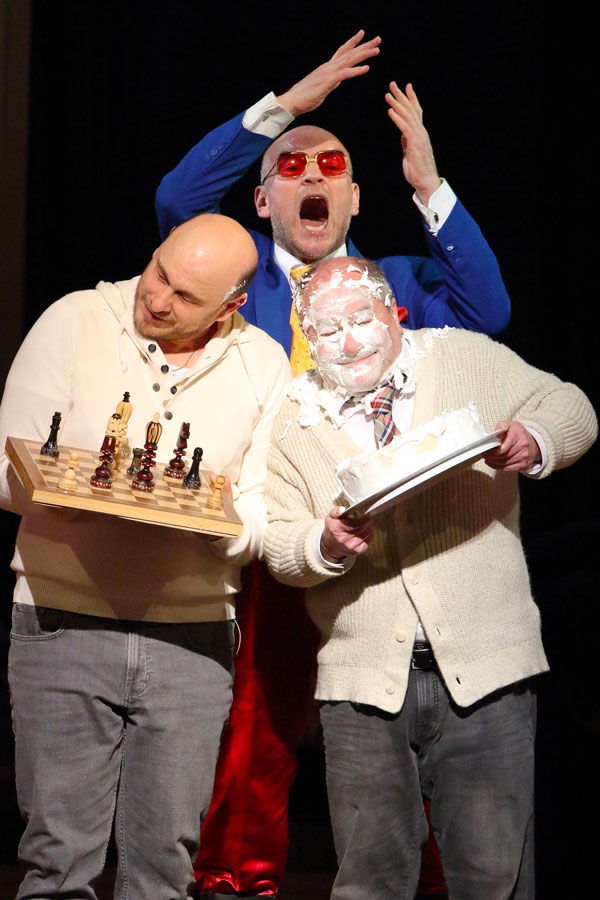
Of course we are in the second degree : the first degree is the propaganda piece intended to encourage the people, the second degree is the vision of power, of the "ogre" (this is how Napoleon was called by his enemies), a comedy figure close to the dictator à la Charlie Chaplin, and moreover this Napoleon sometimes puts his hand on his side, above his pocket, which was a favourite gesture of Hitler.Tcherniakov superimposes the references of the powers that lead to war, he makes them into dangerous puppets, and obviously in the context of the day – any allusion to another autocrat of today is not accidental.…
Three figures who lead peoples and societies to decay. Because war is decay.
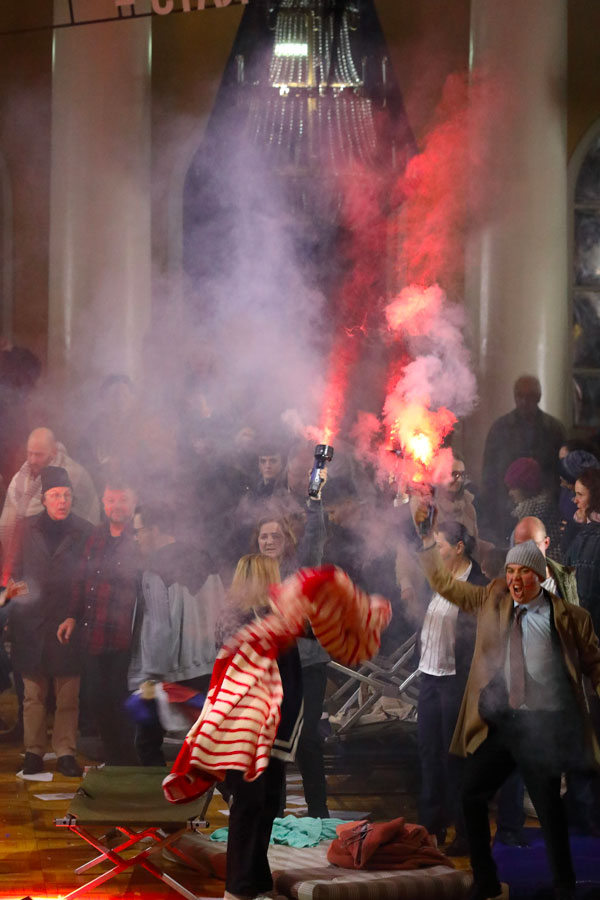
Similarly, the burning of Moscow, which is a key part of the legend of the Russian resistance, is present in the background. In this enclosed space that mimics the war, everything happens elsewhere, in an exterior that is almost a backdrop to the satyrical drama that is being played out before us.
Thus Pierre, who dreamed of killing Napoleon, learns that Andrei is wounded, at the Rostovs' and hidden from Natascha's view, and then seems to wander in the middle of events, almost tossing and turning, constantly commenting without really acting.
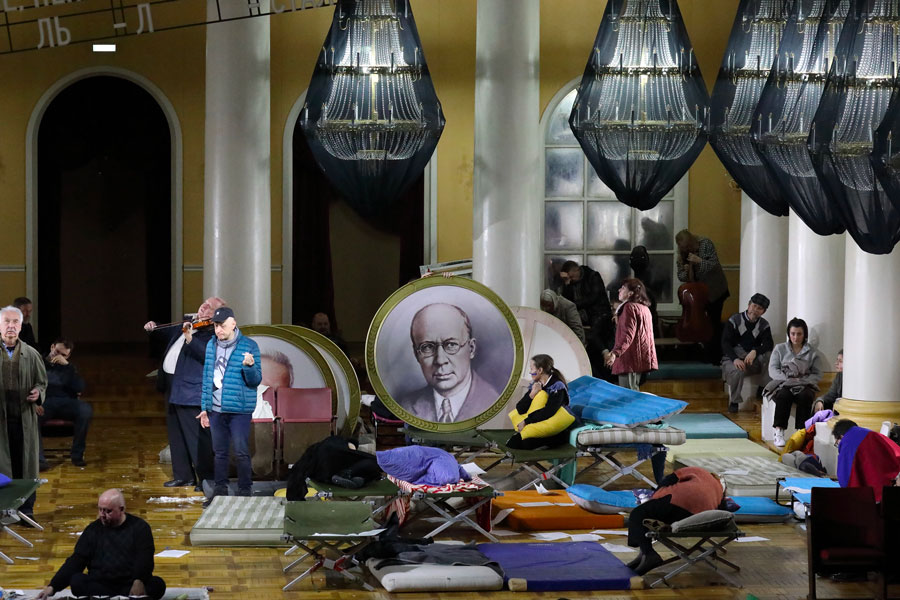
The fire is a surgically analysed episode in Tcherniakov’s narrative, which turns it into a moment of general ruin, of general looting, where the room is cleared of objects and in particular portraits of the greatest Russian musicians Glinka, Tchaikovsky, Mussorgsky, Prokofiev, Shostakovich, while a violinist plays in the midst of the disaster : the end of man, the end of culture, the end of art. Caught up in the turmoil of the fire, in the general sauve-qui-peut, Pierre is taken prisoner and then pardoned by Davout : here again, the scene is one of summary executions, of violence, but Pierre escapes and is pardoned. Arbitrariness can also be fair.
This fire scene, which is one of the most spectacular in the opera, is treated by Tcherniakov as a succession of crazy moments : Peter is pardoned, popes are chased (with their censer): no popes here but people "in civilian clothes" swinging their censer. In all this crowd, we will never know who is who, who is where, who is doing what. Friends, enemies, French, Russians…
The fire is in the heads, since we don't see it, of this hall (which historically did not burn, in fact), so much so that it triggers a sort of general orgy in the people, the women are raped, scream and it is difficult not to think of certain scenes in Zimmermann's Die Soldaten, and moreover of the scene in Schönberg's Golden Calf of Moses und Aron, premiered on March 12, 1954 in Hamburg, exactly one year and one week after Prokofiev's death.

The orgy scene, which in a way replaces the burning of Moscow (one madness for another), is interrupted by Kutuzov, the new Moses, who from the upper gallery fires a pistol shot that interrupts the madding crowd and utters, "what a terrible vision", addressed here to the madding people, whereas in the libretto it is the vision of Moscow that is burning.
At this point, Tcherniakov shows a people burning, a society that eats each other up, where everyone is turning against everyone else. After a moment's pause, everyone lines up and starts fighting again in a vacuum, as at the beginning of the second part. Again a sort of chorus in the void. It is clear that from the initial play we end up with a nightmarish vision that corresponds exactly to the vision expressed by Tolstoy. And once again, we are beyond the circumstance, in a moment where the effects of the war exceed the men and their strength, and lead to the vertigo of the absurd.
It is after this moment, in which Tcherniakov has turned the legend into a horror, that the most heart-rending scene of the evening takes place : Andrei's death, which we might call, the death of lovers.
Andrei enters the stage in the courtyard, sits down on one of the theatre chairs that are lying around, and shoots himself.
This is the symmetrical position of the initial scene of the first part, where, sitting in the garden, he had tried to end his life, but where the two young girls had made him believe in life.
There is a kind of logic in Tcherniakov's narrative that accompanies the succession of Prokofiev's tableaux. After a scene akin to Sodom and Gomorrah, choral, collective, crazy, we focus on the individual, who has also seen his life ruined, and who decides to end it all. Apocalypse of the people and suicide of the individuals.
The scene is constructed in a very attentive, precise manner, with Natascha arriving, finding Andrei and the two of them literally starting a last waltz, as difficult and unsuccessful as the first one at the initial ball, but this time seen as a desperate effort to live, to find a real or dreamed reunion. In the background, two violinists, as if they were angel musicians from a sad paradise. Each one (Olga Kulchynska, sovereign of naturalness, and Andrei Zhilikovsky with overwhelming accents), tries to touch the other, where all embrace is only an effort to make the wounded Andrei stand, where there is reunion and impossibility, and where nevertheless the dream is there, but of a future in another place.
Then the scene ends with the couple falling asleep wrapped in a blue sheet (Ukraine blue?) which will remain on stage until the end, a kind of antagonistic presence which will respond to the theatrical death that the last scene shows us. It doesn't matter then that Tcherniakov makes this scene an unreal parenthesis, the stage is in darkness, the two lovers are alone, separated and detached from the world, finally living their story in a parenthesis that closes on their sleeping bodies.
The last scene should close with the people's chorus. But Vladimir Jurowski chose the first version of the work that Prokofiev wrote, in which the choir is replaced by an ensemble of wind instruments.
Tcherniakov uses this musical choice to construct one of those final scenes that leave you breathless with their originality and accuracy.
This is first of all an epilogue.
Pierre and his fellow prisoner Platon Karatajew : they are still prisoners of war, an officer forces them to move on and kills Platon, exhausted and ill. Meanwhile, in the background, the room is cleared and set up, and partisans free Pierre and kill the officer who was holding them.
But the spectator is unable to distinguish who is who ? The aggressor ? Aggressed, we don't read anything. Peter carries a branch of foliage probably intended for a ceremony, but which one ?
Intentional confusion, at the end, we no longer know who is who and who is doing what, while the libretto shows the liberation of the prisoners of war by the Russian partisans : but in this final moment, the impression is that the theatre is over, in favour of an even more "theatrical theatre".
Pierre recalls the dead, his wife, Andrei, and also Kuragin who has lost a leg, Natascha is in Moscow, and a future is emerging. Pierre is closing the plot, the plots that fuelled the first part and that the 'war' interrupted : in fact he is closing a series of catastrophes and he remains alone in the middle of the stage, with his head in his hands…
Behind him, a sort of great ritual takes place : the war is over, the folding beds and mattresses are set up to build a parade bed between flags, pennants, plants and flowers. There is no triumphalism, but a particularly cruel look at the people who have built this bed, who have brought the decorative objects and the branches, like a pagan cult of deification.
Kutuzov then stands on this bed and announces that Russia is saved, then lies on the parade bed, now a catafalque, like the great dead hero, while a brass band sounds (instead of the triumphant chorus) and gives a sarcastic and sour sound to this scene where on the parade bed lies the repulsive Kutuzov with at his feet, the couple Andrei-Natascha wrapped in his little blue sheet and in the middle Peter awash with despair.
What was supposed to be the triumphant finale of the eternal (and Stalinist) Russia, the "saved Russia" becomes a cruel theatrical masquerade, accompanied by grating music, where the hero (Kutuzov as a surrogate of Stalin – or indeed of any staged and sacred autocratic power) is exposed in the same place where Stalin was seventy years earlier in an excessive staging, while the real hearts lie entwined at his feet.
In the story, Prokofiev's death was hidden in 1953 so that it would not interfere with the only ceremony that mattered. Thus the squeaky, dare I say cringey music of this finale is even more emblematic : the music of the one whose death is hidden accompanies the funeral procession of the bloodthirsty autocrat. Who is great here ?
A contrasting scene, also terrible when one thinks of what the finale was supposed to celebrate, which ends in irony and where the false pomp (the parade bed is made of all the mattresses and folding beds we have seen throughout the evening) also indicates an end to this theatre in which no one believes anymore. How can we believe in a production that celebrates a triumphant Russia ?
This work is profoundly nihilistic and desperate : it leaves a very bitter taste, the observation of a decay that leaves the group and the social body without response and without reaction : the "people" are in silent procession around the parade bed and the "hero". War is stupefaction, but also anaesthesia of judgement. Tcherniakov was careful never to paint war live, but always through its induced, deleterious, amoral, crazy effects, like an unreasoned derangement, a deconstruction of everything that makes society.
The final image is the field of ruins of strong souls in the foreground, and in the background the false triumph of the arsonists, the arsonists of the world and of humanity.
The extraordinary work of Vladimir Jurowski
It is then that, in the face of this merciless treatment, a vision is needed in the pit that not only matches, but surprises and shows where the genius lies. Yes, Prokofiev has been accused of complacency with the regime, as has Shostakovich, especially by those who gossip from the comfort of a distant salon. In his television interview, Jurowski testifies for artists caught up in the turmoil and storms who are just getting by as best they can. He cites Richard Strauss, who gradually withdrew to Garmisch, and who created Capriccio in the Munich theatre in 1942, the midst of the Second World War, of which David Marton produced such a strong and disturbing production (in Lyon and then Munich) and which we reported on.

A novel like Grossman's Life and Fate deals with these situations, which are constantly subject to the vagaries and changes of mood at the top : everyone should read it to understand what structural fear is, and what is carefully organised and maintained in a population. Prokofiev wanted to return to Russia, Shostakovich chose to stay there, and reading Grossmann, one thinks of them so strongly. In their position, it was impossible not to give in at least to the demands from “above”…
Jurowski, who has already conducted The fiery Angel in Munich under the direction of Barrie Kosky, knows perfectly well that for a long time only The Love of Three Oranges was favoured by theatres, that The fiery Angel was until recently only rarely performed (for its violence and the questions raised about relations with women, the question of hysteria, etc.), but if Berlin recently offered (moreover in a production directed by Tcherniakov) a remarkable production of The Betrothal in a Monastery, which this site has reported on, there is little or no performance of The Player. ), even less Semyon Kotko, whose subject is difficult but whose music is powerful, and even less of The Story of a Genuine Man, which was forbidden by Zhdanov.
The adventure of the performance of Prokofiev's lyrical works is therefore complex, far from being closed today, and if War and Peace is performed outside Russia in the major theatres (the MET, Paris Opera for example and recently Geneva), the work, because of its size, is not often performed, and therefore remains poorly known and, above all, is the victim of a reputation of heaviness, due to its monumentality and its status as a propaganda tool. Some even consider War and Peace to be the worst of Prokofiev's operas.
Jurowski's task was therefore, above all, to deliver a version of Prokofiev's work of a radically different colour, since selective memory essentially retains the memory of the collective scenes of the second part, of big machines that are quickly accused of Sovietism, and less the complexity of the score nor its variety and refinement. Jurowski had to disprove this reputation. Without this denial, Tcherniakov's work would not have had such an effect on the audience.
This was the divine surprise of the evening : Vladimir Jurowski delivered a Prokofiev that was the opposite of what is usually expected, and the rendering of his musical direction alone justified the production. Beyond a remarkable staging, which concentrated the eyes, it is the
the way in which the conductor imposed, from the pit, a truth of the work that must first be affirmed and retained.
Jurowski proposed a musical version in which he made numerous cuts (notably in the chorus) to the text that was too explicit, impossible to hear in today's circumstances, and perhaps not the most interesting musical parts. He also made choices among the four versions left by Prokofiev, as well as the choice we mentioned of the first version for the final scene.
By concentrating the music in a sharper way than in the usual versions, he has thus constructed particularly enlightening games of contrast and opposition.
As I have often pointed out, no one is in a composer's or author's head to guess his intentions, even when he presents them. How many very official prefaces signed by authors to their texts that they take the liberty of contradicting in their works, it is almost even easier for composers who play on what a text says and what a piece of music says (or contradicts). Mozart did this in Le Nozze di Figaro, for example, to circumvent censorship, in full agreement with his librettist Da Ponte.
How, for example, can we regard the finale we have heard as a triumphant conclusion ? The music itself does not seem to be of definitive quality, and Jurowski accentuates its weaknesses or hollows through his interpretation ; it is a triumph with, in its hollows, something else, which Tcherniakov's staging then illustrates. But in this particular case, it is the musical choice and what we hear in the last bars that delivers a truth of this music, which is not Stalinist…
It's an example : the composer "composes" in every sense of the word, literally and figuratively, he composes a piece of music, in the literal sense, he composes it, that is to say he arranges it to make it say something in the first degree, but through details of instrumentation, through particular lines or phrases, he lets something else be said or guessed. The fact that Prokofiev returned to the work several times shows that he had to compose it, arrange it and come back to it, and above all shows that there is no absolute truth in this work as it was delivered at the time of its creation, and justifies Vladimir Jurowski's interventions and choices a posteriori.
We have already emphasized Jurowski's familiarity with Prokofiev, and in his approach he never ceases to play on the contrasts of a score of unsuspected richness, as he dissects it and offers it to the audience.
In particular, in the first part ("Peace", or at least what serves as peace in this production), we discover a lyricism that we did not expect, which has its source in Tchiakovsky's post-romanticism (one thinks of Onegin), as well as in certain Straussian or Puccini colours. Prokofiev was perfectly aware of the developments in the music of his time, spent in exile between Europe and the United States from the Bolshevik revolution to 1932. Jurowski undertakes to show in this music all the refinements, the sense of melody, the lyrical will, but also the colours that accompany each scene, even each character. Jurowski shows the complexity of the composition, but also his attention to serving the libretto, the characters, sometimes suave, sometimes ironic, sometimes sarcastic. In the ball scene (the second scene of the piece), the dances and waltzes certainly evoke a certain courtly pomp, but without ever losing a distance, which precisely makes these dance tunes sometimes ironic commentaries, waltzes certainly, but a bit grating. Moreover, Prokofiev is a master of ballet music, who knows how to describe events and who also knows how to take the desired distance. It is no coincidence that the dance, whether sketchy or not, is so present in the production : it accompanies the music, which is both first and second degree. And Jurowski knows perfectly well, through the clarity of the approach, through the emphasis on certain instruments, through variations in rhythm, how to make this music express both its tenderness and its cruelty. The waltz reprise of Andrei's death scene is an example of this, with its waltz rhythm awakening to life again, but at the same time syncopated and terribly dark. Jurowski's precise approach and skilful use of colour constantly tell us of a double music, to be taken in several degrees, even in its most lyrical letting go, one can always distinguish an underlying tension. Even peace is sad in this work.
What Jurowski shows, especially in the first part, is first of all a supreme elegance of this music where one would expect more brutality and coarseness.
Jurowski thus denies this, because as a great opera conductor, he accompanies the text, he accompanies what the singers say (the accompaniment to the Pierre-Kuragin scene is a masterpiece of chiseling, as is the way in which he lets Maria Dimitievna's voice blossom in front of Natascha in their great scene in which the orchestra almost comments on what is said.
So we obviously expect a more choral and collective second part all the more.
We get a first glimpse of this in the initial scene of the second part, scene 8 ("Preparation for the Battle of Borodino"), where the room is pitch black and absolutely silent, then the sound explodes like a bomb, an orchestral and vocal bomb. In this case Jurowski accentuates the contrasts, the violence, but the staging underlines a violence "in a vacuum". As in the first part, the lyricism was mixed with melancholy and also a little nihilism, this time it is the violence that is too strong, too "staged" to be real. I thought of two memories, firstly when the great conductor Kirill Petrenko comments that the music of the Siegfried-Brünnhilde duet in Siegfried is too excessive to be a true love duet, but only a duet that mimics the love that the words deny (we have dealt with this at length elsewhere), and secondly a reading of Flaubert's L'Éducation sentimentale , the famous episode of the "invasion of the Tuileries", which begins with a revolutionary invasion of the people who first roar and storm through the palace and end up scattered around the rooms like a small lapping stream.
From the terrible chorus in preparation for Borodino to the vision of a "war game" where, perfectly supported by the staging, Jurowski sets limits to the demonstration of violence, accentuates the more fluid moments, and jerks the rhythms to break the epic. He makes the music sound a little false with its excessive demonstrative force. Even if the violent parts are strong, they are never heavy, always clear, always well-articulated, always legible and limpid and never massive. This approach prevents any manifestation of excess and at the same time illustrates the staging that shows a war through its effects and not live.
Certainly, other theatrical effects mitigate, Andrei's intervention, never aggressive and always soothing, even if carried by bitterness, those of Pierre, more and more heartbreaking : Prokofiev himself offers breaths, but even in his crescendo of violence which culminates at the moment of the fire in the scene I have called the orgy (in the staging) which diverts the episode from the fire. The staging complements the music and gives it another colour because the (symphonic) episode is accompanied by screams and a Dantesque vision of hell that changes its meaning. At the same time, the martial music that accompanies these scenes becomes a terrible statement of self-destruction. After Kutuzov's intervention, Jurowski lightens and attenuates the music to gradually accompany the chorus that follows in a martial manner, but without too much support, it still accompanies a scene of abysmal emptiness of thought and of humanity.
The peak of bitterness, the Natascha – Andrej scene, on the border between dream and reality, is also conducted with a desperate lyricism, where the orchestral accompaniment is both suave and tense, sweet and bitter, and cannot be detached from the vision of the two violins in the background. I have called these violins the angel musicians of a sort of lost paradise. But this creates a dialectic between the pit and the stage, as in the accompaniment to the looting scene earlier, where the portraits of the great Russian musicians were paraded with a violinist playing alone in the middle, as if the real thing was on stage and in the pit there was something more distanced, almost false. As if the truth of art and of the heart were in the scenic vision of this "musical" death, when the real musical accompaniment of the pit offered only an impeded, poisoned lyricism, like this impossible waltz that the orchestra plays for the lovers.
The first moment is accompanied by a softened orchestra, where the text is underlined by the woodwinds (piti…piti…piti…) and where the orchestra very discreetly lets us hear a sort of delirium from Andrei reminiscent of the last moments of Boris (in the same spirit, placing the scene that is going to follow between the real and the unreal, but at the same time in a true tradition. Jurowski here lightens up, working on the rhythms, a discreet crescendo. With the appearance of Natascha, a change of colour, we enter a waking dream where we find something of the idyllic atmosphere of the first scene here, which is tinged with an elegiac, i.e. painful, colour. From the tension of death a la Boris (In Mussorgsky's Boris Godunov), we move on to sighs and memories, to a bitter lyricism ; the orchestra follows each movement of the stage in an osmotic way, it keeps its clarity, its precision, follows and breathes each word, and gives a colour of infinite sadness to the whole. The fleshy strings, present but never overpowering, the discreet presence of the harp, the sometimes-pointillist woodwinds, echoing the words, everything is incredibly constructed, rigorous, and at the same time seems incredibly natural because it never takes precedence over the two voices that lead the variations of colour. One discovers an incredible richness of orchestration as if everything was concentrated in this moment, the lyricism, the bitterness, the unfathomable sadness, one passes unceasingly from one atmosphere to the other, until this sketched and heart-rending waltz which will almost sanction the end. One of the musical summits of the performance, which is also a scenic summit, because here the one does not go without the other, down to the smallest details (the violins at the back of the stage which alternately play and stop depending on the moment).
It has also been emphasized at length how much the final tableau negates the triumphalist atmosphere intended by the musical choice of the wind ensemble that accompanies the final procession and the exposed parade bed. A sarcastic vision in which Jurowski carefully avoids a finale that would be final, without triumphalism or climax. The curtain falls on this grating music which does not close anything, which almost leaves you in suspense, and simply shows the state of the disaster.
This symphonic and lyrical lacework, full of attention and breathing at all times, is made possible by the extraordinary performance of the Bayerisches Staatsorchester, which shows here a concentration, a sonic precision and a control of volumes that confirms our opinion : here we have the best pit orchestra in existence, the orchestra was able to breathe in unison with its conductor and respond to the slightest of his impulses, in incredible technical perfection. And for the first time since Vladimir Jurowski became GMD (Director General of Music), we have the real impression of a perfect artistic understanding, of a total commitment of the orchestra around its conductor, which we had some difficulty in experiencing sometimes since his arrival in this position.
The same can be said of the choir, even though it has been cut back a number of times "for a good cause". Conducted by David Cavelius, whose qualities are well known from his work at the Komische Oper, it was able to commit itself scenically and vocally with particularly powerful but never excessive interventions, always keeping a real control so as never to fall into caricature. The result is a magnificent performance, one of his best in recent years, which shows a careful and long preparation for a work that was entering his repertoire.
Voices close to perfection
With seventy roles and forty or so performers (some of whom, as is traditional, played more than one role) it is difficult to account for all of them, but the commitment of the Ensemble or the Studio and some of its protagonists must first be acknowledged, Emily Sierra, Martin Snell, Bálint Szabó, Liam Bonthrone, the delightful Elmira Karakhanova with her lovely soprano, Christian Rieger and especially Kevin Conners, a characterful tenor who takes on many roles and this time as De Beausset gets a cream pie. Other smaller roles are excellently held : Christina Bock is excellent as Andrei's sister Princess Maria or the veteran Serguei Leiferkus as old Prince Bolkonski. In any case, what characterises the whole cast is the excellence of each one, even in very small roles, in very punctual interventions, one can think of Alexander Roslavets' Balaga (in the Opera Ensemble in Hamburg) or Oksana Volkova's Matrioscha who plays a real character, as well as tenor Mikhail Gubsky's Platon Karatajew. Special mention should be made of Dmitry Cheblykov's Denissov, with his beautiful bass baritone voice, and Aleksei Bonarciuc's Dolochov, who is particularly expressive. And at last, Alexandra Yangel's Sonja, who is heard mainly in the first part and particularly in the first scene, has a very pretty timbre that works perfectly with that of Olga Kulchynska.
In the more profiled characters, let's underline first Olga Guryakova, always efficient (here as Peronskaja, Maria Dimitrievna's friend), and Violeta Urmana, who since she resumed her mezzo roles which correspond to the current state of her voice, has found a presence, a scenic intelligence, a significant expressivity on stage. She plays a firm, human Maria Dimitrievna with a sharp, well-projected voice. In addition, she works regularly with Tcherniakov, who knows how to make her a real character, and her Maria Dimitrievna is a magnificent composition.
Victoria Karkacheva's appearance as Hélène is also very well cast, an interesting voice already heard in Lyon, a committed character, who portrays this light and dancing Hélène in contrast to her husband Pierre. A nice profile.
Another very well portrayed character, the bad boy Kuragin of Bekhzod Davronov, who has worked a lot on expressiveness and irony with his relatively light Italian-style tenor voice, with a particularly striking stage commitment, an expressive and very mobile face. A nice discovery.
Last year we heard Arsen Soghomonyan in Hermann in The Queen of Spades in Baden-Baden, where he played the role with dignity, but without transcending it. Here he is an exceptional Pierre Bezoukhov. The character runs through Tolstoy's novel in which he is the main hero, here we find him practically from beginning to end and he lists the dead and missing characters at the beginning of the final tableau in his heartbreaking solitude. Tcherniakov makes him a more mature character than the others, less "seductive", in no way romantic, good but stubborn, whose only real action is to chase Kuragin (the scene is particularly powerful). Vocally he imposes himself here with a powerful, very controlled voice, with particularly clear phrasing, with a model expressiveness, which strikes by the way he marks the words, varies their weight, chisels their sound. Thus one perceives the subtleties of the text and the role, with a real stage presence. Without a doubt, this is a role that suits him perfectly and he is a great success, perfectly deserved.
Andrei Zhilikhovsky is a near ideal Andrei. He has the physique of the role, a romantic hero on the margins (I have mentioned a sort of romantic Wozzeck) and, moreover, most of his singular interventions are placed by the director on the margins of the stage, on the side, right or left, on the old theatre seats. But above all he has the right tone for the role, a warm, smooth tone, without any roughness, of an ineffable sweetness, a tone that already carries in itself despair or drama, a tone as if predestined. We heard this sweetness last year in Iolanta in Baden-Baden (conducted by Kirill Petrenko) and it still strikes today.
But there is also the phrasing, the delivery, the text spoken with all its colours, the expressiveness, and everything in the acting that expresses her reserve, her stiffness, her shyness, her singularity. The voice has a beautiful range, it is very well projected and particularly clear. One can hear behind this baritone voice the positive Verdian characters or the sacrifices of the opera repertoire, the Posas, the Simon Boccanegra, because it has a particular roundness that soothes and moves immediately. From the very first scene, this Andrei is overwhelming.
Olga Kulchynska's Natascha, who confirms that she is now a lyric soprano of rare intensity, is perfectly suited to this gentle, melancholy Andrei. We consider her to be the best possible Susanna of the Nozze di Figaro today because she possesses both the poetry and the sparkling, slightly sly side. She is a young, controlled, particularly expressive voice that knows how to play with colours. She admirably plays the ambiguity of the character, her youth, her thirst for life, her naivety too, and at the same time the other side of the coin, her slightly scatterbrained way of acting, her inability to distinguish what is true from what is false. The voice remains clear, always moving, with an impeccable vocal line (it will undoubtedly be a Puccinian voice that is more expressive than what is heard on the market today), and at the same time barely perceptible shadows of involuntary cruelty. A voice that knows how to be incisive, and she complements Zhilikhovsky's warm baritone well, and also knows how to have other heart-rending reflections that lacerate you, nevertheless always keeping an incredible freshness mixed with an exceptional intensity. There are few singers who are immediately intense. Tcherniakov was able to exploit this strong stage personality, one of the lyric soprano voices that should count because she knows how to sing immediately beyond the notes, spontaneously drawing a universe, a character : a singer who knows what music means. No wonder she is such a good Mozartian : she sings from the heart. Great performance.
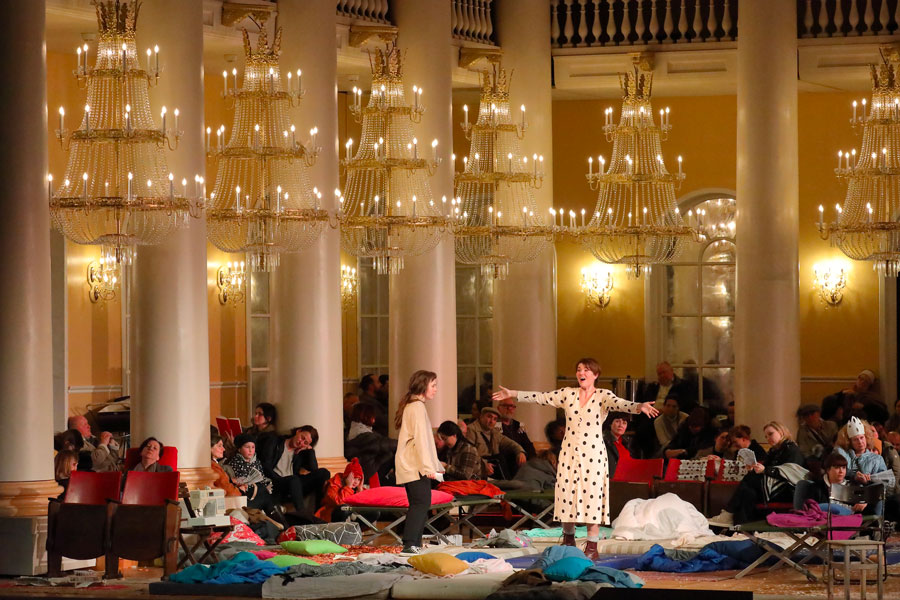
At the end of the road, an observation : we have not seen here an ordinary representation of War and Peace because it immediately takes its place not as a historical narrative or a propagandist illustration, not as a destructive vision of a Russia outlawed by current events, but as a parabola of war as external and internal destruction, as a disease which devours everything and which, in the end, makes nothing distinguishable, friend or foe, by annihilating a sleepwalking social body. Everything is swallowed up in the crusher.
The other element of the parabola is the nihilistic vision of power when it is affixed to singular beings, be they the Tsar, Napoleon, or this Kutuzov who is presented to us. They all have something repulsive about them, and yet populations have believed in them or in their distant successors, abdicating their thoughts – and therefore their freedom – for a chimera (this is the meaning of the final image). A terrible vision that strikes us today, from Trump to Putin and all those who now stink up the world. This final scene is to be meditated upon, wherever the temptation of strong power reigns, inevitably deceitful, inevitably destructive.
So against this, this music, which was thought to be Stalinist propaganda music, is revealed, thanks to Vladimir Jurowski's incredible work of purification and cleaning, to be refined, lyrical, ironic, sarcastic, becoming an exercise in freedom, an exercise in thought, freed from the plaster gangues built by preconceived ideas.
It is the union of this musical approach and this scenic approach that finally gives us a modern reading of the work, free of its history. “Gesamtkunstwerk".
NEXT PERFORMANCES AT BAVARIAN STATE OPERA : 2 and 7 July 2023
